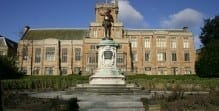Nottingham
Nottingham Medical School opened in 1975 and now takes in 330 students annually including for their Nottingham and Lincoln undergraduate programmes and their Derby graduate programme.
Nottingham Medical School (NMS) is currently ranked 29th in the UK for medicine by the Complete University Guide and 34th in the UK by the Guardian.
About The Course
Medicine at Nottingham includes a biomedicine degree, unlike most other universities in which students need to take an extra year out in order to obtain a second degree. The case-based learning approach means students will get to grips with real patient scenarios that focus on the integral clinical points.
There are written examinations in the form of ‘short answer’ and ‘single best answer’ formats, audit projects for student-selected component and research method assignments.
Nottingham Medical School is also famous for their world-leading research in a variety of medical fields, giving students with an interest in research a fantastic foundation.
Nottingham also offers a graduate entry programme based in Derby and a six-year programme including a foundation year.
Nottingham Medicine offers a more classical course, split into two preclinical years and three clinical years.
Structure Of The Course
Year 1-2
Your first two years at Nottingham are focused on the studies needed to obtain your integrated Biomedical Degree. Modules in these years include Biomedical Skills and Integrated Medicine with second-year teaching building upon the knowledge learnt in first year. There are a variety of teaching methods which provide an engaging and well-rounded learning experience.
These include clinical skills, case-based learning, eLearning, lectures and tutorials. Additionally, anatomy teaching includes full-body dissection which is unique to only a few Medical Schools in the UK. Finally, you will still get a good amount of clinical exposure and interaction with patients.
Year 3-5
After the completion of your biomedical degree, clinical years start in which you will spend much more time in the hospital undergoing placements in different areas of medicine.
Students will experience six-week placement in four main hospitals centred around Nottingham in addition to a variety of GPs. In the final year, students have a six-week elective placement in which they have the opportunity to study abroad.
Academic Requirements
GCSEs: A minimum of six GCSEs at Level 7 (A), including both Biology and Chemistry. You must have achieved a minimum of a grade 6 (B) in Maths and English Language.
A-levels: AAA Must include Biology (or human biology) and Chemistry.
Scottish Higher: AAABB To include English Language, Mathematics, Biology and Chemistry. The latter two must be achieved at an A grade each.
Scottish Advanced Higher: AA Biology and Chemistry
International Baccalaureate: 36 points 6,6,6 at Higher Level, including Biology and Chemistry. Note: There are alternative qualifications available for international students, however, it is important to note that qualifications from some countries may be required to enter via the foundation route.
IELTs (International applicants only): 7.5 (no less than 7.0 in any element)
Bachelor's Degree (Graduates only): Minimum 2:1 degree in addition to the A-level requirements outlined above.
Further Entry Requirements
Work experience: Although there is no specified number of hours required for Nottingham, they do expect applicants to have engaged in work experience as part of their application. This is important to demonstrate you have a realistic idea of what a career and degree in medicine involves and will also help you with the interview stage of the application.
Personal statement: Not considered as part of the application process.
Admissions Process
Application to Nottingham Medical School must be done via the Universities and Colleges Admissions Service (UCAS). Deadlines for submission are earlier for medical courses, typically mid-October. This application will include all of your academic history as well as your personal statement and other qualifications/achievements. The first stage of the admissions process is looking at academic criteria - so make sure you meet the requirements outlined above before you apply!
Admissions Tests:
UCAT ✅
All candidates are required to sit the University Clinical Aptitude Test (UCAT) in order to apply for Medicine at Nottingham. While there is no cut-off score applicants must achieve, your UCAT makes up part or the entirety of your score used for interview selection. Candidates with band 4 will not be accepted.
In 2022 the average UCAT score of candidates invited to interview was 2846, however, minimum score statistics are not available.
Interview Type: MMI
Interview Topics: Nottingham puts a greater emphasis on GCSE grades compared to other universities. When selecting candidates for an interview, NMS scores students based on both their UCAT scores and GCSE grades.
Applicants with international qualifications may only be scored based upon their UCAT score. Importantly, the verbal reasoning component of the UCAT is given double the score compared to the other sections. Once candidates have been ranked based on their score, the top x amount will be invited to interview.
If you receive an offer to interview at Nottingham, these will take place online usually between December and February. NMS uses Multiple Mini Interviews (MMI’s) for their interview stage of admissions. These consist of six stations in which one will include role play and should last no longer than one hour in total.
Qualities Nottingham aims to assess in their interview includes communication skills, teamwork, and respect for patients and colleagues and are overall based on the qualities outlined in the Medical Schools Council.
You can find out more about interviews at Nottingham Medical School in our school-by-school guide.
If you are successful with the interview stage, you can expect an offer from March.
Admissions Statistics
| Total number of applicants: | 2095 |
| Total number of places: | 330 |
| Total number of entrants: | 330 |
| Acceptance rate: | 15.75% |
Fees
| Home students: | £9250 pa |
| Rest of UK: | TBC |
| International students: | £28699 pa |
Teaching Methods
Teaching style: Nottingham delivers a blended teaching style with a huge variety. This includes case-based learning, eLearning, full-body dissection, lab sessions, tutorials, lectures, placements and many more.
Intercalation mode: Not offered.
Graduate Prospects
About 96.5% of students graduating from Nottingham Medical School were in employment or further study 15 months after graduating, with an average earning of £35,089.
FAQs
How competitive is Nottingham Medical School?
This is somewhat difficult to answer as not many admissions statistics have been released. However, in 2020, the acceptance rate was 11% but will vary year-by-year.
What is unique about Nottingham Medical School?
NMS is unique in a number of ways including its two-degrees-in-one medical programme in which students gain a biomedical degree in addition to a medical degree. Additionally, Nottingham uses full-body dissection in their anatomy teachings which few schools in the UK still do.
What Grades do you need for Nottingham Medical School?
A Level grades required for consideration at NMS are AAA including both biology and Chemistry. There are additional requirements such as GCSE grades and alternatives to A-levels outlined above in ‘Academic Requirements’.
Is Nottingham a Russell Group University?
Yes, Nottingham University is one of the 24 Russell Group Universities in the UK.


